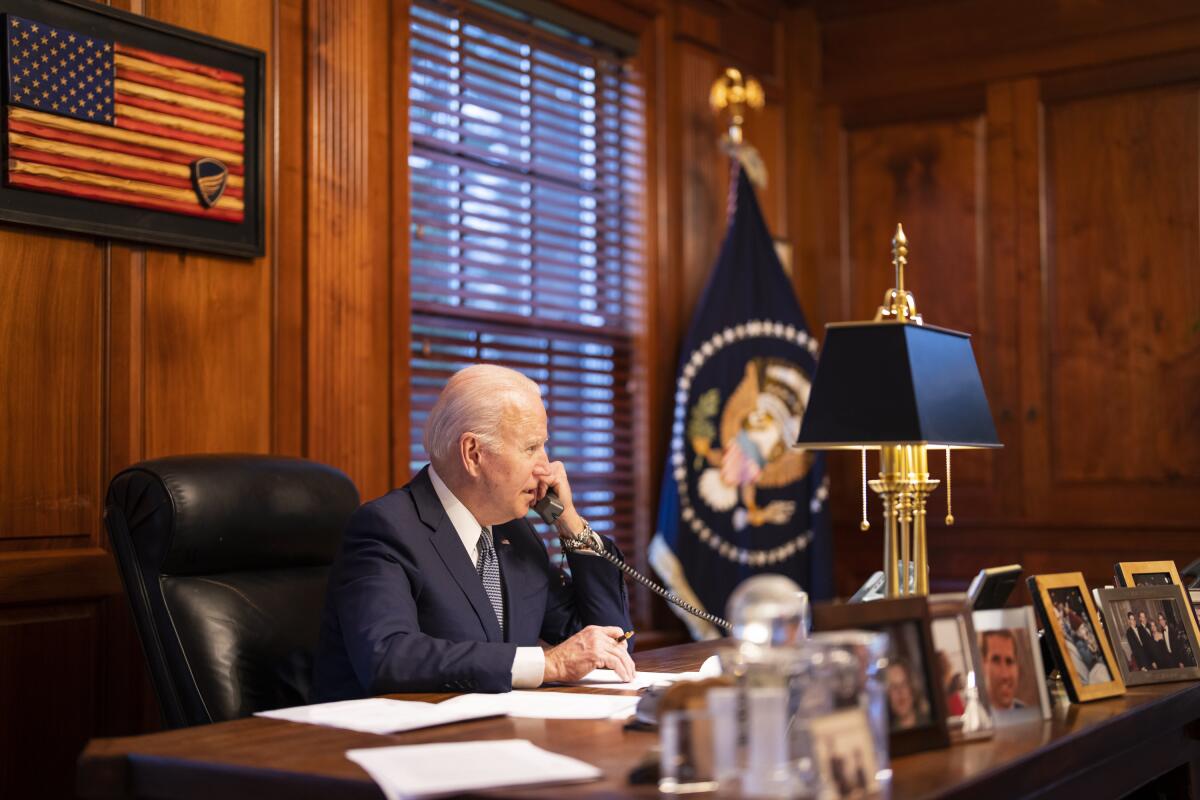Biden and Putin speak again on Ukraine, eyeing next month’s talks

- Share via
WASHINGTON — President Biden and Vladimir Putin spoke by phone Thursday, the second direct conversation between the two leaders in the last three weeks as the Russian leader continues to seek assurances from the West before he draws down troops positioned along his country’s border with Ukraine.
The 50-minute phone call, which a senior administration official described as “serious and substantive,” did not produce any breakthroughs. Rather, it was an opportunity for both leaders, the official said, to “set the tone and tenor for the diplomatic engagement to come” ahead of scheduled talks next month in Geneva.
White House Press Secretary Jen Psaki said in a statement that Biden “urged Russia to de-escalate tensions with Ukraine. He made clear that the United States and its allies and partners will respond decisively if Russia further invades Ukraine.”
In expressing his support for diplomacy ahead of the Geneva talks, the president “reiterated that substantive progress in these dialogues can occur only in an environment of de-escalation rather than escalation,” Psaki said.
Administration officials have said they did not know why Putin sought to speak to Biden, who warned his Russian counterpart in a Dec. 7 video call not to invade Ukraine. Neither leader will take part directly in the bilateral talks starting Jan. 10 in Geneva.
The White House remains hopeful that talks and the threat of stiff economic sanctions from the U.S. and its European allies would be enough to deter Putin from invading. But in the three weeks since his last conversation with Biden, Putin has done little to signal what direction he may choose, keeping the roughly 100,000 Russian troops in place along the Ukraine border but not yet attacking.
In the meantime, he has continued to demand security guarantees from the North Atlantic Treaty Organization, wary of the alliance’s efforts to shore up Ukraine’s defenses.
“The Kremlin is highly incentivized to create ambiguity about what exactly they are doing,” said Ian Bremmer, president of the Eurasia Group, a New York-based global risk assessment firm.
According to the administration official who briefed reporters after the call, Biden again made it clear to Putin that the U.S. was consulting closely with NATO allies and that it will be up to Russia to determine whether to resolve the situation diplomatically or risk economic sanctions by attacking Ukraine.
“Our focus is really on action, and indicators, not on words at this point,” said the official, who spoke on condition of anonymity to describe the leaders’ call. “So we’re going to continue to monitor very closely the movement and build up of Russian forces on the Ukraine border and prepare ourselves for whatever decision ultimately is made by the Russian president.”
More to Read
Get the L.A. Times Politics newsletter
Deeply reported insights into legislation, politics and policy from Sacramento, Washington and beyond. In your inbox twice per week.
You may occasionally receive promotional content from the Los Angeles Times.











